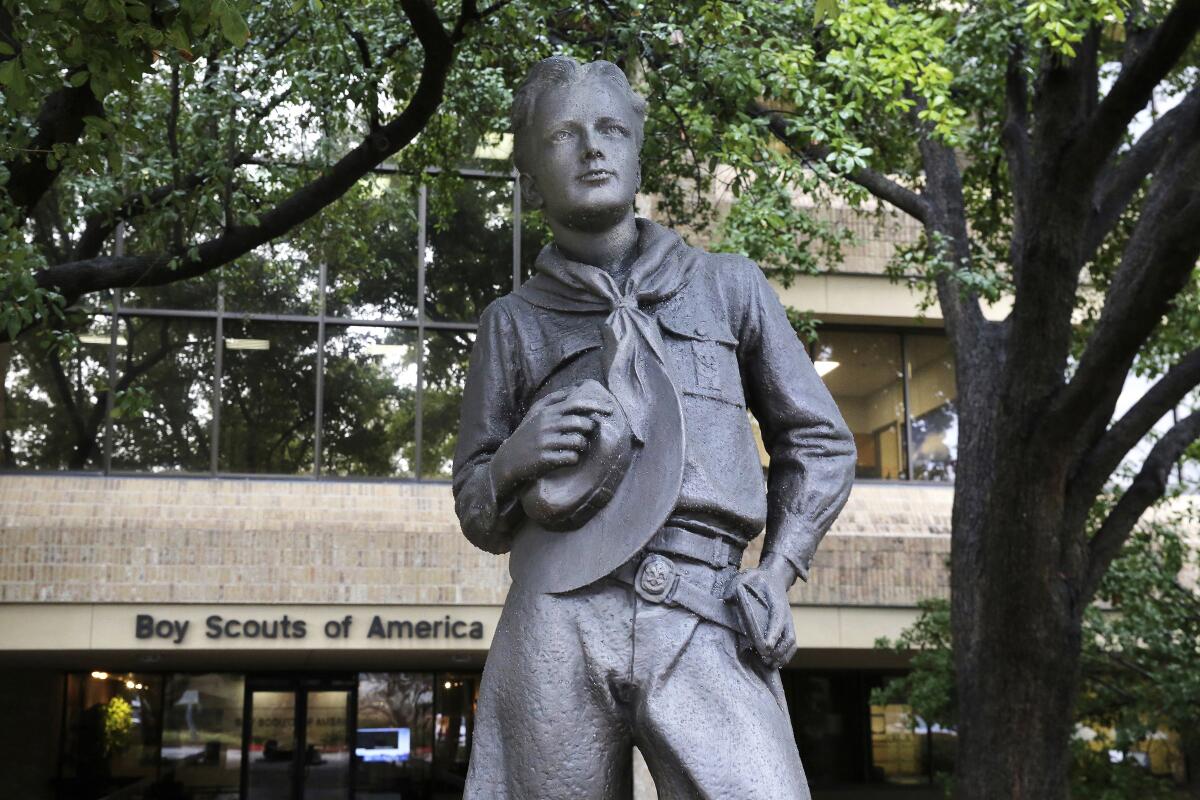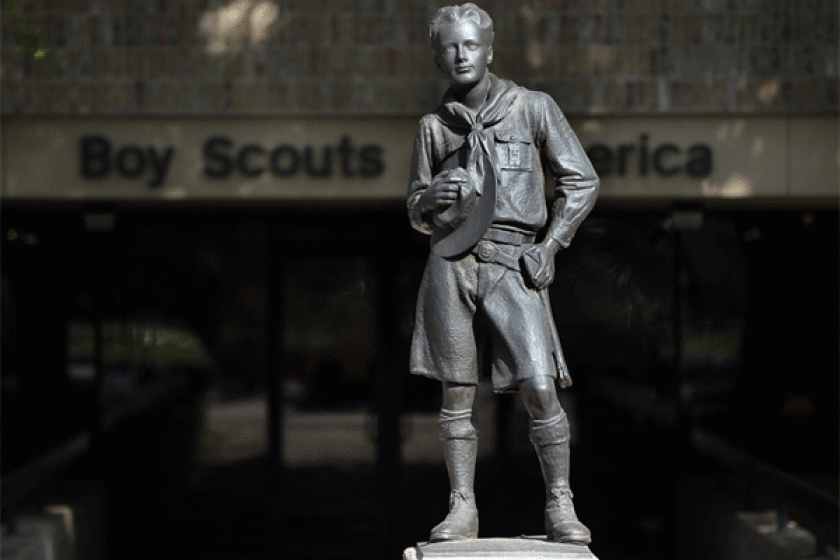Boy Scouts propose more than $300 million, Norman Rockwell paintings to settle sex abuse claims

The Boy Scouts of America, struggling to stay afloat while compensating tens of thousands of survivors of past sexual abuse, has pledged to provide a victims’ trust fund with at least $300 million from its local councils and proceeds from insurance policies and the sale of a collection of Norman Rockwell oil paintings.
The offer was detailed in a reorganization plan submitted by the Scouts, which filed for bankruptcy protection last year amid a wave of new sex abuse lawsuits after several states, including California, New York and New Jersey, expanded legal options for childhood victims to sue.
The 379-page plan, filed late Monday in U.S. Bankruptcy Court in Delaware, did not place a total on how much the 111-year-old youth organization is willing to pay to settle more than 85,000 sex abuse claims by former Scouts.
But plaintiffs’ attorneys negotiating with the Scouts quickly denounced the proposal, which excludes high-adventure camps and other valuable real estate around the country.
“The plan violates every word and the spirit of the Boy Scout oath that each of us took as kids,” said John Humphrey, chairman of the court-appointed tort claims committee that represents the abuse victims.
At the time of the bankruptcy, the Boy Scouts of America had assets of more than $1 billion, with billions more held by its local councils. Humphrey’s committee estimates that the Scouts’ proposal would result in an average payment of $6,100 per claimant — not counting contributions from insurance companies.
“The BSA and its local councils are not making the effort necessary to provide a modicum of compensation to men and women whose lives were changed forever by BSA’s and the local councils’ failure to protect them as children,” Humphrey said.
Lawyers for individual claimants agreed.
“It’s really disgraceful,” Paul Mones, a Los Angeles attorney who won a landmark $20-million judgment against the Scouts in 2010 and represents hundreds of accusers in the bankruptcy, said of the reorganization plan.
“Considering the enormity of the problem, are they taking care of survivors as they should? I don’t think so,” Mones said.
The bankruptcy put a hold on hundreds of lawsuits to allow for the negotiation of a global settlement, which would release the Scouts from all liability from past abuse. It also required new abuse claims to be handled in that venue rather than in state courts.
By Nov. 16, the court-mandated “bar date” by which claims had to be filed, more than 92,000 claims were submitted, many of them from accusers recruited through aggressive TV and internet advertisements by law firms seeking clients. Several thousand were later weeded out as duplicate filings.
The massive response exceeded all expectations and prompted plaintiffs’ lawyers to predict that the number of claims and the total payouts to settle them would easily eclipse those in the sex abuse scandal that engulfed the U.S. Catholic Church more than a decade ago.
The number of sexual abuse claims and eventual payouts will likely reshape the future of the Boy Scouts of America.
A researcher hired by the Scouts to analyze its internal records in 2019 identified 7,819 suspected abusers and 12,254 victims — a fraction of the number who have filed claims.
In a statement in November, the organization called the massive response “gut-wrenching.”
“We are devastated by the number of lives impacted by past abuse in Scouting and moved by the bravery of those who have come forward,” it said. “We are heartbroken that we cannot undo their pain. ... We are deeply sorry.”
This week, the Scouts called the reorganization plan a “critical step” toward equitably compensating abuse survivors while continuing to carry out its mission.
“There are still many aspects of the plan that we are refining through ongoing mediation, but the amended plan is an important step in demonstrating progress that we believe will ultimately lead to a final plan that the Bankruptcy Court will confirm,” the organization said.
“We are hopeful we can come to a resolution that is in the best interest of survivors and all parties and can emerge from Chapter 11 by this fall,” it said.
While the size of the compensation fund has yet to be determined, it will benefit from the proceeds from hundreds of artworks, including more than 50 paintings by Rockwell. Dozens adorned the covers of Boys Life, a magazine published by the Scouts.
Assets contributed to the fund also will include a couple of buildings owned by the Boy Scouts and gas and oil royalties from wells, some no longer producing, in Texas and more than a dozen other states.
The fund also will receive at least $300 million from local councils, according to the plan. But those contributions will be voluntary, the Scouts’ filing said, and there was no breakdown of how much each council would pay.
In California alone, Boy Scout councils own more than $250 million in real estate, according to Seattle attorney Michael Pfau, whose firm represents more than 1,000 claimants in the bankruptcy.
“It appears very clear the Boy Scouts are trying to conceal the fact that these councils are not paying a fair amount, and worse, they are trying to force abuse survivors to give up their claims for close to nothing,” Pfau said.
Some insurers balked at covering payouts in earlier sex abuse lawsuits, saying the Scouts could have prevented the abuse that led to the claims, court records show.
More recently, some have questioned the validity of thousands of claims in the bankruptcy, contending they were not properly vetted by the attorneys who filed them.
Los Angeles Times review of Boy Scout documents shows that a blacklist meant to protect boys from sexual predators too often failed in its mission.
Some insurers also were quick to dismiss the Scouts’ reorganization plan.
“Century supports a fair resolution for survivors of sexual abuse, but this plan doesn’t get us there,” said Tancred Schiavoni, an attorney for Century Indemnity Coy. “Allowing invalid and fraudulent claims will hurt valid survivors of sexual abuse by delaying and diluting any compensation they may receive.”
Timothy Kosnoff, an attorney with Abused in Scouting, which represents 17,000 accusers, said the insurance companies are “playing games” to avoid paying valid claims.
Kosnoff, who in the past had sued the Boy Scouts hundreds of times, also called the reorganization plan “dead on arrival” and said it is time to liquidate the youth group.
“Let ‘em fail — burn it to the ground,” he said, adding that his organization has been inundated with calls from clients angered by the proposed settlement.
“They’re not saying ‘no.’ They are saying ‘hell no!’” he said. “This plan is pouring salt in the wound and it is an insult.”
Hundreds of lawsuits against the organization came in the wake of the Los Angeles Times’ publication in 2012 of internal Scout records involving about 5,000 men on a blacklist known as the “perversion files,” a closely guarded trove of documents that detail sexual abuse allegations against troop leaders and others dating back a century.
The Times’ yearlong examination of the files documented hundreds of cases in which the Boy Scouts failed to report accusations to authorities, concealed the allegations from parents and the public or urged admitted abusers to quietly resign — then helped cover their tracks with bogus explanations for their departures.
More to Read
Sign up for Essential California
The most important California stories and recommendations in your inbox every morning.
You may occasionally receive promotional content from the Los Angeles Times.












